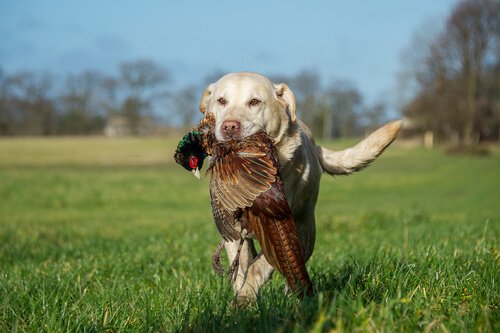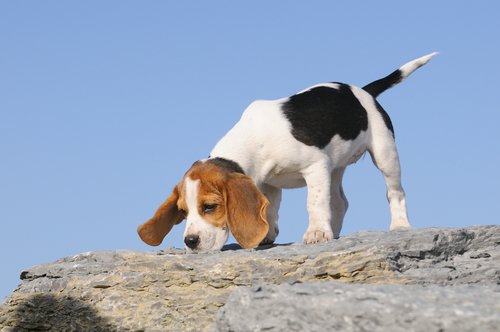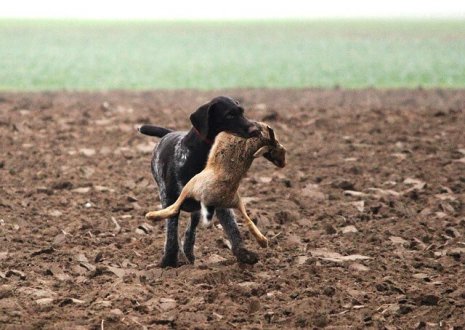How To Know If You Have A Hunting Dog
4 minutes

Knowing if your dog is from a hunting breed helps you learn about his physical or physiological needs. If you pay no attention to this, he might have behavioral problems.
Everyone enjoys looking at pictures of dogs and puppies on the internet where you can see many people next to a pet that they consider to be their inseparable companion. That’s why it’s hard to understand the fact that these tender creatures can also be natural predators.
Research has proven that a dog’s instinct, despite thousands of years of domestication, is to hunt prey. Therefore, it will be useful to know whether your dog is a hunter, or at least if he has more of a hunting instinct than other breeds.
This trait is printed in their DNA, but some breeds are more specifically inclined to be a hunter. Therefore, the both of you are better off knowing if your pet belongs to one of those breeds.
Your dog’s instincts can bring you difficulties, especially if you’re not a hunter. In such cases, his instincts may be a risk for himself and for those around him. For example, a child passing by on a bike or playing ball in the park can be tempting to your dog if he’s a hunter.
How to know if your dog is a hunter
A priori, your dog’s breed will be a good indicator. Although hunting is an innate instinct, some breeds have developed it more, therefore it is important to find out if your if your dog is from a hunting breed.
Among the hunting breeds are beagles, terriers, pointers, setters, retrievers, pug-nosed dogs, dachshunds, Dalmatian and Golden Retrievers, among others. If your dog is one of these, you can be sure that he has strong hunting instincts.

Likewise, there are traits that can help you find out if you have a hunting dog. Since sniffing is common among dogs, those that have very developed hunting and tracking instincts may have a constant or even obsessive habit of doing it.
It seems like hunting dogs are always tracking things during walks. This sometimes makes it difficult to handle them during walks, among other things, because it is a challenge to get them to raise their heads.
When your pet is out of control
If your dog loses control when seeing other animals and starts chasing after them, then you definitely have a hunting dog. If you had a domestic dog, then he wouldn’t go hunting or kill an animal, either inside or outside your house.
It can be funny at first when your pet arrives with prey in its mouth. However, when this attitude isn’t controlled, it can become dangerous because your dog may not be capable of distinguishing which animals are prey and which are your neighbor’s pet.
You must be able to detect these signs to find out if you have a hunting dog. If you aren’t sure and want to prevent problems, you should seek advice from an expert.

What to do if you have a hunting dog
If you already know you have a hunter dog, then you should take action to ensure their safety and that of those around them. Your neighbors and animals living around you would appreciate it:
- Walking help your dog helps your dog unleash his true nature. If he sees an animal that triggers off his instincts, he’ll chase after it. So, it’s a good idea to avoid walking in places where that could happen.
- Good training is a priority. Teach your dog to obey certain orders.
- Make sure you take precautions to prevent him from escaping your home. Even opening the door for a visitor may be the perfect opportunity for him to escape. He will look for any opportunity to unleash his tracing and hunting instincts.
- It’s a good idea to avoid signals that reinforce their negative behavior against possible prey. For example, a cat, mouse and even a smaller dog can become prey. You can train him by using a loud sounds or spraying him with liquid when a potential prey is nearby. You may want to get professional help for this.
- Hunting dogs require a lot of exercise. Going on several walks daily walks and doing physical activities is important you dog. That way you can get rid of all of that energy he has built up from not hunting.
- Although you may not like using restrictive measures, sometime using a muzzle and leash will be necessary.
In short, hopefully this information was useful to help you figure out if your dog is a hunter and what you should if you have one. When you have a pet, you must recognize his characteristics in order to give him the best care possible.
